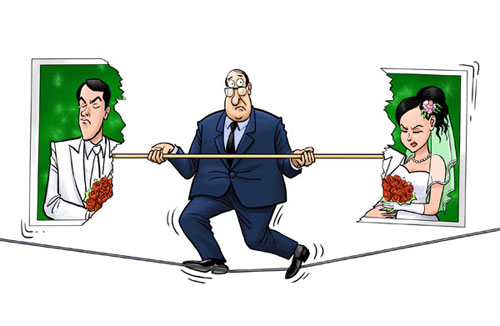When home is a battleground
Li Ming is bitter. First, her five-year marriage ended - she's convinced her husband had affairs - and now she's in a legal battle for the apartment they lived in. "He's reluctant to share a single tile with me," said Li, a Shanghai native. She believes she co-owns the apartment, which is registered in her husband's name.
A wife's property rights are a greater issue than ever in China as the divorce rate rises. Last year, 1.96 million couples applied for divorce, a 14.5-percent increase from 2009. The average annual increase since 2003 is 7.6 percent.
Legislators are walking a tightrope to protect, but not overprotect, women in marital property rights. Overprotection in legislation could lead to gender inequality and even to opportunism by women who want to marry rich men, several divorce lawyers said.
Under current divorce law, husbands and wives each get half of the marital assets unless one is proven to have acted in a way that violated the marriage - specifically, through bigamy, domestic violence, abandoning the family or living with a lover for three months or longer. The law calls these transgressions "faults".
Now the Supreme Court is addressing pre-marriage assets, particularly property such as a house, in a draft interpretation of the Marriage Law. The draft was issued in November, soliciting public opinion, in part to resolve a wide national disparity in rulings on similar cases.
The draft says that a person has sole ownership of a pre-marriage asset, including its appreciated value, unless his or her partner proves contribution. Whether that contribution includes intangibles, such as the value of child-rearing, is up to the judge hearing a divorce case.
Some experts complain that legislators are not doing enough to protect women - and in most cases it is the woman at risk - who could be left homeless under the draft. The fundamental difficulty for the wife lies in her inability to provide evidence of her husband's misconduct.
In practice, lawyers said, asset division in most divorce cases is fair to women, sometimes favoring them. The key issue is whether husbands and wives should be treated the same in legislation about asset division.
They should not be, said Jiang Yue, a law professor specializing in marriage law at Xiamen University in Fujian province.
"Wives are often financially disadvantaged. It is not because they are not capable," she said. "It is because they sacrifice themselves for the household work and family. As they are not in an equal position, treating them the same means unequal."
In a traditional Chinese marriage, the husband buys a house and the wife spends her life looking after it, and the old and the little members of the family, and supporting her husband's career.
How do you prove it?
Li Mingshun, a law professor at China Women's University in Beijing, said women should be compensated better in a divorce. But there's the matter of evidence.
|
Residents of Nanjing, capital of Jiangsu province, visited a real estate fair in the city last October. A house is often a problem when couples decide to divorce. |
"It is not possible for me to prove his adultery," said Li Ming, who said that a year ago she accidentally saw her husband's text messages inviting women to spend the night with him. "He denied everything. And how can I obtain evidence of him in bed with his lovers?"
In cases of infidelity, "You have to not only prove they were living together but also prove they were living together for three months. It is really difficult," said Song Jian, a divorce lawyer with Beijing King and Bond Law Firm. "And sometimes, it's just a one-night-stand, which is not counted as a fault but is quite popular."
Song said about 70 percent of couples divorce because of affairs. "Mostly it is the man."
Typically, he said, the husband handles the family finances and can hide or transfer marital assets before or during a divorce. The law doesn't punish that, Song said.
Li accused her husband of trying to move their assets to a secret account to avoid splitting them with her. "I asked the courthouse to check his bank accounts and found out that he started transferring his income to other accounts soon after we got married," she said.
"But the judge has only given him a warning, threatening to inform his employer if he continues to do that," Li said.
 0
0 









Go to Forum >>0 Comments